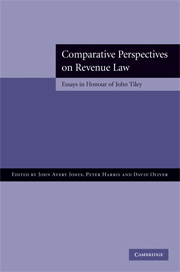Book contents
- Frontmatter
- Contents
- Contributors and affiliations
- Foreword by Dave Hartnett
- Foreword by Hugh Ault
- 1 A comparison of statutory general anti-avoidance rules and judicial general anti-avoidance doctrines as a means of controlling tax avoidance: Which is better? (What would John Tiley think?)
- 2 The judicial approach to avoidance: some reflections on BMBF and SPI
- 3 Comparing the application of judicial interpretative doctrines to revenue statutes on opposite sides of the pond
- 4 Abuse of rights and European tax law
- 5 The US legislative and regulatory approach to tax avoidance
- 6 The law of taxation and unjust enrichment
- 7 The history of royalties in tax treaties 1921–61: Why?
- 8 Land taxation, economy and society in Britain and its colonies
- 9 Meade and inheritance tax
- 10 Taxation, human rights and the family
- 11 Family connections and the corporate entity: income splitting through the family company
- Epilogue: Establishing the foundations of tax law in UK universities
- References
- Table of cases
- Table of abbreviations
- Index
1 - A comparison of statutory general anti-avoidance rules and judicial general anti-avoidance doctrines as a means of controlling tax avoidance: Which is better? (What would John Tiley think?)
Published online by Cambridge University Press: 07 December 2009
- Frontmatter
- Contents
- Contributors and affiliations
- Foreword by Dave Hartnett
- Foreword by Hugh Ault
- 1 A comparison of statutory general anti-avoidance rules and judicial general anti-avoidance doctrines as a means of controlling tax avoidance: Which is better? (What would John Tiley think?)
- 2 The judicial approach to avoidance: some reflections on BMBF and SPI
- 3 Comparing the application of judicial interpretative doctrines to revenue statutes on opposite sides of the pond
- 4 Abuse of rights and European tax law
- 5 The US legislative and regulatory approach to tax avoidance
- 6 The law of taxation and unjust enrichment
- 7 The history of royalties in tax treaties 1921–61: Why?
- 8 Land taxation, economy and society in Britain and its colonies
- 9 Meade and inheritance tax
- 10 Taxation, human rights and the family
- 11 Family connections and the corporate entity: income splitting through the family company
- Epilogue: Establishing the foundations of tax law in UK universities
- References
- Table of cases
- Table of abbreviations
- Index
Summary
Introduction
There is an inverse relationship between quantity and quality with respect to many things, including writing about tax avoidance. Everyone working in the tax area has views about tax avoidance and almost everyone, it seems, feels an irresistible urge to inflict these views on others. Most of the writing on tax avoidance is in the nature of fast food: quickly prepared, consumed, digested and forgotten – and, if consumed in excessive quantities, dangerous to your (mental) health. In a fast-food world, master chefs are revered and celebrated. Professor John Tiley is a master chef with respect to offerings about tax avoidance. His writings about controlling tax avoidance constitute the fine-dining experience, the Michelin three-star restaurant in a world of greasy spoons, chains and all-you-can-eat buffets. It is fitting that we celebrate his contributions.
The subject of my paper is a comparison of a statutory general anti-avoidance rule and judicial general anti-avoidance doctrines as methods of controlling tax avoidance. The paper assumes, fairly I think, that specific statutory anti-avoidance rules and limited judicial anti-avoidance doctrines such as sham are necessary but not even nearly sufficient to deal effectively with tax avoidance. The issue can be framed in a number of ways.
- Type
- Chapter
- Information
- Comparative Perspectives on Revenue LawEssays in Honour of John Tiley, pp. 1 - 24Publisher: Cambridge University PressPrint publication year: 2008
- 1
- Cited by



